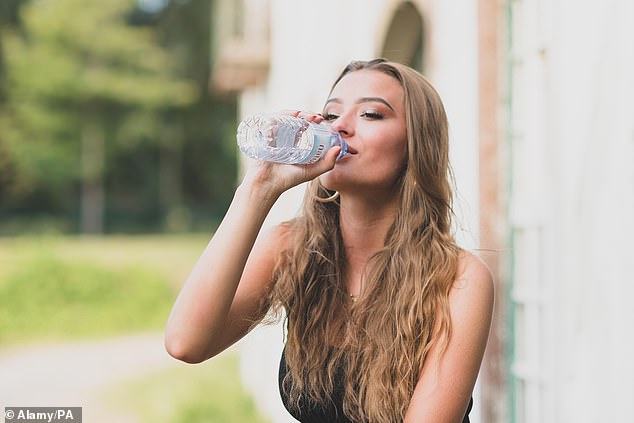Americans taking Ozempic could be at risk of deadly heat stroke amid soaring temperatures.
The US is currently experiencing a ‘heat dome,’ which occurs when the atmosphere traps hot air over certain areas like a lid on a pot.
It’s ripping through the Midwest and Northeast, with temperatures expected to exceed 100 degrees Fahrenheit this week.
At temperatures this high, heat stroke could strike in under 15 minutes without proper air conditioning, hydration and shade.
And while it’s well known that high temperatures make you sweat and lose water, dehydration could strike even quicker for people taking weight-loss drugs like Ozempic and Wegovy.
Doctors told DailyMail.com that while semaglutide and tirzepatide in weight-loss drugs suppress hunger, they may do the same with thirst, as the drugs cause the body to process fluids more slowly, causing less desire to drink.
Eating less food also means the body is taking in less water, especially from hydrating summertime favorite foods like watermelon.
Without enough water intake, dehydration and heatstroke can set in quickly and lead to cramping, fainting, dizziness, slow pulse, low blood pressure, vomiting, delusional thoughts and behaviors, hallucination and coma.

As temperatures heat up across the US, doctors warn people on weight-loss drugs like Ozempic could be at a greater risk of dehydration (stock image)


Reality stars Heather Gay (left) and Dolores Catania have both admitted to using weight loss drugs
Your browser does not support iframes.
Dr Britta Reierson, a family physician and obesity medicine specialist in at Knownwell, told DailyMail.com: ‘If an individual is experiencing side effects that increase the risk of dehydration, and at the same time are exposed to environmental impacts such as a heat wave when the need for hydration is higher, dehydration can occur much more quickly.
‘Heat waves cause increased sweating as the body tries to cool down and maintain a normal body temperature. This additional fluid loss, combined with fluid loss from nausea, vomiting and reduced intake, can lead to severe dehydration and heat related illness if not properly managed.’
Around 1,200 Americans die from heat-related causes every year, though officials note the actual number could be 10-fold higher due to underreporting.
Meanwhile, about one in eight Americans – around 40million – has reported taking a GLP-1 agonist at some point.
GLP-1 agonists mimic the hormone GLP-1, which is released after eating, to slow digestion and increase feelings of fullness. In turn, this leads to eating – and drinking – less.
Dr Sandip Sachar, a dentist at Sachar Dental in New York City, said while ‘this effect is more pronounced with food emptying, it can also slow the emptying of liquids.’
GLP-1 receptors are found in the lamina terminalis, a region of the brain that senses thirst and regulates water balance.
Weight-loss drugs may bind to those areas to decrease feelings of thirst, though research on this mechanism is still early.
Dr Sachar said: ‘Slowing of GI emptying may reduce hunger and also may prevent thirst. Patients have told me that when they feel full, it is more difficult to drink a lot of water.’
People taking Ozempic or similar drugs for obesity are also more likely to have conditions like high blood pressure, heart disease and kidney disease, all of which raise the risk of dehydration, Dr Reierson said.
These conditions may reduce thirst and lead to retention and other fluid imbalances.
Ashley Koff, a registered dietitian and founder of the Better Nutrition Program, also told DailyMail.com: ‘When you are taking a medication that slows gastric emptying, dehydration is a concern because the stomach acid and digestive juices, as well as overall metabolism and digestion and elimination, require optimal hydration.’
Dr Kavin Mistry, a neuroradiologist and longevity expert, also pointed to common GLP-1 side effects like nausea and vomiting as a cause of dehydration.
‘When fluid is not being replaced efficiently, the risk of dehydration increases, particularly in warmer weather when water needs are already higher,’ he said.
Additionally, eating less food overall also decreases fluid intake.
Dr Reierson told this website: ‘We often forget that food contributes to our daily water intake and eating less can lead to lower hydration.’
Summertime favorites like watermelon, cucumbers and tomatoes are more than 90 percent water and can help boost fluid intake.
Dr Sachar also recommends chewing sugar-free gum to increase saliva production, which can stave off dehydration, and steer clear of acidic foods and sugary drinks.
And Dr Reierson added: ‘I don’t recommend that patients at higher risk for dehydration stop or not take a GLP-1 medication, however, it is important to exercise extra caution and work with your healthcare provider to ensure a comprehensive plan and strategy.’
Dr Mistry recommends people on weight-loss drugs set reminders to drink water regularly, even if you’re not thirsty, and steer clear of drinks like caffeine and alcohol, which are dehydrating.